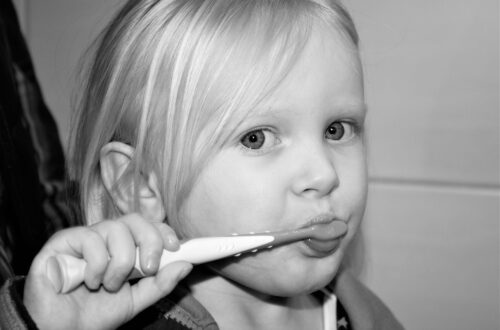
The Difference Between Discipline and Punishment
Is there a difference between discipline and punishment?
I grew up in the age of authoritative parenting. “Spoil the rod to spare the child,” was the mantra that my parents and their friends lived by. Oh, did we learn the rod! In those days, if you stepped out of line then you felt it.
I know that my parents did what they truly felt was best for us. But was it really the best way? Are punishments the only way to discipline? Are they the best way to discipline? Or, can discipline mean something different?
What is the difference between discipline and punishment?
At the very heart of it, discipline is about teaching and training. Punishment on the other hand is about negative consequences for wrong actions.
Sometimes discipline will involve consequences, but consequences are not the only way to discipline a child.
Punishments are focused on what has already happened, and the hard payment for it. Discipline, if done well, is forward-looking. It endeavours to give a set of skills for the child to use moving forwards. (Li)
When a child is making wrong choices the parents need to adjust the behaviour. They have the choice to make that adjustment via punishment or via discipline. Let’s look at each method in a little more detail.
Adjustment via punishment
Two assumptions are being made when parents use only punishments to correct behaviour. The first assumption is that without a threat of a negative repercussion hanging over a child’s head they will choose to be naughty.
The second assumption is that being naughty is a always a willful choice and the child has the ability to make the right choices.
I would contend neither of these assumptions is true.
The truth is most children want to be good. They might also really want sweets, toys, the red cup and to never sleep. They often want to be good too.
Children want to belong, to connect, and to be healthy, which are all the things we want for them. Unfortunately, though, they often do not have the skill sets, the understanding, or the self-control to make the right choices. Instead, their other wants, worries or emotions can take over.
Patience, critical thinking, empathy, kindness and self-control are traits that many children struggle with, as do many grown-ups. The same as grown-ups, many children can make great decisions some days but then have days where they find it hard to keep it together.
If a child is being punished regularly, but not being given the support that they need to make the right choices, they often become stressed, and worried about the next time they might mess up. Repeated punishments can cause them to see themselves as naughty or bad, yet feel that they lack the skills to be good.
Adjustment via discipline
Discipline is looking at what you want to teach the child, and what is the best way to teach it. (Siegel and Bryson, 2016)
There may still need to be consequences. For example, sometimes a child could lose a privilege if they are struggling to be responsible with it, or they may need to be removed from a situation if they are not behaving appropriately.
The focus, however, will be on how to move forward rather than on a punishment for what has been. There are a plethora of tools that parents can use to teach children the skills integral to living a healthy, happy and kind life.
By teaching your child the skills they need to make the right choices, you give them more control over themselves and how they behave. This can significantly boost their self-esteem.
The Science Behind Gentle Discipline
Science gives us a few reasons why gentler and proactive discipline works better than punishments.
Upstairs or downstairs?
The brain is complex, but let’s look at it as two halves. The upstairs brain and the downstairs brain.
The downstairs brain is the first to develop and is all about survival. As well as operating some important functions, like breathing it also controls the fight or flight response.
Fight or flight was the stress response that would have been imperative to our ancestors in their more perilous times. Fight or flight shuts down your thinking brain, which is analytical and slow. Then instinct facilitates hasty retreat (flight) or self-defence (fight.) It is a defence and will kick in whenever the brain perceives a threat.
The upstairs brain develops later and oversees critical thinking, problem-solving, empathy, and patience. (Conkbayir, n.d.)
When we discipline our children, we want to be working with their upstairs brain, however, if they feel threatened the downstairs brain will be running the show. In fight or flight mode our little ones will be unable to reason.
To learn more about the two halves of the brain, check out this article, which goes into more depth.
A little gentleness and empathy from us can help your child feel safe and get the upstairs brain back in control to give you the best chance of teaching the lessons that you want to teach.
Pure Chemistry
Your child has chemicals, or hormones, controlling their body’s different functions, and carrying messages throughout their body.
Cortisol is the hormone which helps your child’s body respond to stress. If children are in strict environments with frequent punishments, they are likely to have an excess of cortisol released in their bodies. (Australia) Excess cortisol has been proven to shrink the brain and cause issues with memory loss. (Mandal, MD)
The science of self-believe
A child who believes that they are competent, strong and have a high self-worth will not just be happier, but will also start to emulate the qualities that they see in themselves. There have been studies that show that self-belief has an impact on performance. Many children will follow the narrative that you lay out for them. If they are often punished harshly, not trusted, and reminded of their mistakes they will see themselves in a negative light and act accordingly. (Sutton, 2020)
If, however, you highlight their potential, celebrate their successes and believe in them, even in their worst moments you can rewrite this narrative.
How to discipline gently
We have talked about the why, now let’s look at the how.
Disclaimer: Gentle parenting often gets a bad name, as it can be confused with passive parenting. I am not advocating stepping back, and letting your six-year old call the shots.
Gentle parenting is about proactively teaching and setting firm boundaries in a loving and empathetic way. That is, you connect with your child, and acknowledge their feelings, but you do not let their feelings run the show.
Here are a few ways that you can start disciplining gently.
Unite to fight
A big difference between discipline and punishment, is when we discipline we play on the same team as our child.
Discipline doesn’t have to be us versus our child. You can work with your child. If your child is struggling with an attitude or behaviour, sit with them and work out a plan to move forward. Ask them to brain storm solutions with you
If you are at a loss there are so many online resources and books on overcoming nearly everything. If you have an older child, spend time researching together to find creative ways to support them in overcoming difficult behaviours.
As well as engaging their upper brain, as you come up with solutions alongside your child, you will connect with them and teach them how to problem solve.
Remember that they are children
This may seem obvious. It is easy, however, to forget that their brains are not yet developed. They are going to struggle with some of the upper brain behaviours. I often put adult expectations on my nine-year-old, and forget, heck, he is just nine.
As you remember their limitations, and bring grace and patience to the table, remind them too. Growing up is hard, and the world can be brutal. Let them know that making the right choices takes practice. Every good choice that they make is a step in the right direction and celebrate it. Every wrong choice can be learnt from.
Make consequences immediate, fair and manageable
Long-term punishments don’t usually work well, but giving immediate consequences may be more beneficial.
Consequences that they can manage are even better. For example, rather than sending your child to their room for 10 minutes, send them to their room until they have calmed down and are ready to make things right. Rather than banning them from the screen for a week, ban them from the screen until they have helped you with something in the house. Giving them that control helps them work towards where they need to be, and can help their confidence.
Avoidance
Avoiding misbehaviour is a lot easier than correcting it. Simple things can help children to be their very best selves. Communicate well, and in advance if you can about plans so that they know if they are coming or going. Make sure they are fed and well rested. Connect in lots of positive ways.
A final note
If, like me, you were raised in the days of punishments, and authoritative parenting, this may all seem unnatural and weak.
This is not weakness. It is not about letting children do as they please without consequences. You are still laying down clear guidelines, and ensuring that your children are aware of the correct attitudes and behaviours.
Gentle discipline is about being strong, loving and wise. Strong enough to hold your peace, loving enough to get alongside your child, and wise enough to discern the very best way of teaching them.
You and your child are stronger than ever together.
Reference list
Australia, H. (2023). The role of cortisol in the body. [online] www.healthdirect.gov.au. Available at: https://www.healthdirect.gov.au/the-role-of-cortisol-in-the-body#:~:text=It%20can%20help%3A [Accessed 12 Mar. 2024].
Conkbayir, M. (n.d.). Neuroscience: Understand the ‘upstairs’ and ‘downstairs’ brain. [online] Nursery World. Available at: https://www.nurseryworld.co.uk/features/article/neuroscience-understand-the-upstairs-and-downstairs-brain [Accessed 12 Mar. 2024].
Lehman, J. (2020). Empowering Parents. [online] Empowering Parents. Available at: https://www.empoweringparents.com/article/how-to-give-kids-consequences-that-work/ [Accessed 12 Mar. 2024].
Li, P. (2019). Discipline and punishment – what’s the difference (4 Effective discipline Strategies) – Parenting For Brain. [online] Parenting For Brain. Available at: https://www.parentingforbrain.com/discipline-vs-punishment/ [Accessed 12 Mar. 2024].
Mandal, MD, Dr.A. (2018). Stress can cause memory loss and brain shrinkage finds study. [online] News-Medical.net. Available at: https://www.news-medical.net/news/20181025/Stress-can-cause-memory-loss-and-brain-shrinkage-finds-study.aspx [Accessed 12 Mar. 2024].
Siegel, D.J. and Bryson, T.P. (2016). No-Drama Discipline : The whole-brain way to calm the chaos and nurture your child’s developing mind. New York: Bantam Books.
Sutton, J. (2020). Self-Esteem and Children: Your Ultimate Guide (incl. Activities). [online] PositivePsychology.com. Available at: https://positivepsychology.com/self-esteem-for-children/.









